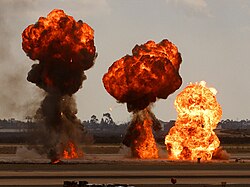Explosion
an explosion is when somthing explodes

An explosion is a sudden increase in volume and release of energy in an extreme manner, usually with the generation of high temperatures and the release of gases.
The most common artificial explosives are chemical explosives, usually involving a rapid and violent oxidation reaction that produces large amounts of hot gas. Gunpowder was the first explosive to be discovered and put to use. Other notable early developments in chemical explosive technology were Frederick Augustus Abel's development of nitrocellulose (guncotton) in 1865 and Alfred Nobel's invention of dynamite (stabilized nitroglycerin) in 1866. See the article on explosive material for more detail on chemical explosives. A new order of explosive, the nuclear bomb, was invented in 1945 by Allied scientists. In 1952, the US military developed the first fusion bomb. Boiling liquid expanding vapour explosions are a type of explosion that can occur when a vessel containing a pressurized liquid is ruptured, causing a rapid increase in volume as the liquid evaporates. A high current electrical fault can create an electrical explosion by forming a high energy electrical arc which rapidly vaporizes metal and insulation material. Also, excessive magnetic pressure within an ultra-strong electromagnet can cause a magnetic explosion.
Explosions are common in nature. On Earth, most natural explosions arise from volcanic processes of various sorts. Explosive volcanic eruptions occur when magma rising from below has much dissolved gas in it; the reduction of pressure as the magma rises causes the gas to bubble out of solution, resulting in a rapid increase in volume. Explosions also occur as a result of Earth impacts. On other planets, vulcanism and impacts cause explosions with various frequency.
Solar flares are an example of explosion common on the Sun, and presumably on most other stars as well. The energy source for solar flare activity comes from the tangling of magnetic field lines resulting from the rotation of the Sun's conductive plasma.
Among the largest known explosions in the universe are supernovae, which result from stars exploding, and gamma ray bursts, whose nature is still in some dispute.
Notable explosions
- Chemical explosions
- Nanaimo Mine Explosion 1887
- Halifax Explosion 1917
- Battle of Messines 1917
- Oppau explosion, Ludwigshafen, Germany 1921
- Bari Explosion 1943
- Bombay Blasts 1944
- Port Chicago Disaster 1944
- Texas City Disaster 1947
- Soviet N1 rocket explosion 1969 (Largest explosion in rocketry history)
- Flixborough disaster 1974
- PEPCON disaster, Henderson, Nevada 1988
- Ryongchon disaster 2004
- Hertfordshire Oil Storage Terminal 2005
- Nuclear weapons (nuclear explosions)
- Nuclear testing
- Trinity test
- Castle Bravo (most powerful American nuclear weapon ever detonated)
- Tsar Bomba (most powerful nuclear weapon ever detonated [by the USSR])
- Use in war
- Nuclear testing

- Steam boiler explosions
- Exploding volcanoes
- Astronomic-scale events
- Tunguska event
- Gamma-ray bursts
- Supernova
- Crab Nebula supernova
- Exploding animals
